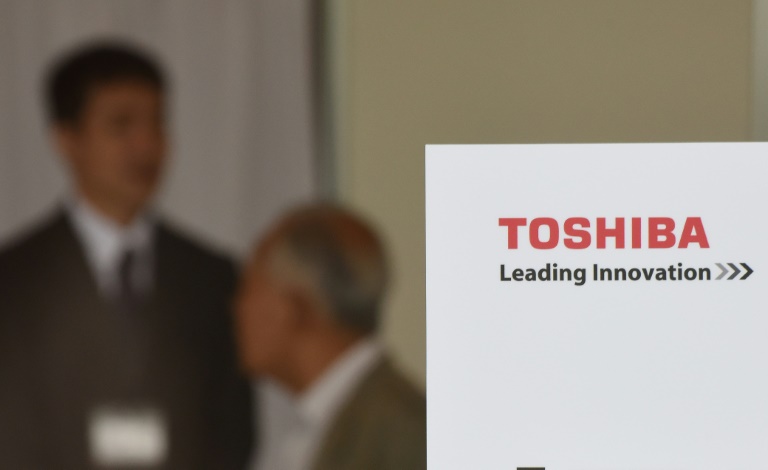Executives at crisis-hit Toshiba faced hundreds of angry shareholders Wednesday as the firm announced it has not yet clinched a deal to sell its prized chip business to a consortium of US, Japanese and South Korean investors.
The sale, reportedly worth about 2.0 trillion yen ($18 billion), is seen as crucial for the cash-strapped company to plug massive losses at its US nuclear division, Westinghouse Electric.
Last week Toshiba said it had entered into exclusive talks with the public-private Innovation Network Corp. of Japan, state-backed Development Bank of Japan and US private equity fund Bain Capital, with South Korean chipmaker SK Hynix acting as a lender.
The company hoped to announce the sale before the investor meeting but said Wednesday that negotiations were still continuing.
“It is taking time to reach a consensus because the consortium comprises multiple parties,” it said in a statement.
“Toshiba intends to continue the negotiation toward reaching a definitive agreement at the earliest possible date.”
Toshiba is the world’s number-two supplier of memory chips, behind South Korea’s Samsung.
The sale involving state-backed buyers means the Japanese government will effectively own the chip division.
Japan had concerns about losing a sensitive technology amid questions about security around systems already using Toshiba’s memory chips, which are also widely used in data centres.
The profitable division has accounted for about one-quarter of Toshiba’s total annual revenue.
The multi-billion-dollar losses at Westinghouse have raised doubts about the future of Toshiba, one of Japan’s best-known companies, which is still recovering from a 2015 accounting scandal.
The firm is now probing whistleblower claims of financial misconduct by senior managers at the nuclear US unit.
– ‘Unfair interference’ –
Toshiba has repeatedly delayed the release of its long-overdue earnings data, saying it needed more time to gauge the impact of Westinghouse on its balance sheet.
Toshiba said it has so far found no evidence to warrant criminal charges against Westinghouse executives.
“I apologise from the bottom of my heart to shareholders and other stakeholders,” Toshiba chief executive Satoshi Tsunakawa told investors Wednesday.
The chip unit sale is seen as key to Toshiba’s turnaround, but it could still face a roadblock. US-based partner Western Digital, which jointly runs a key chip plant in Japan, opposes the sale.
Toshiba’s chief executive blasted the US firm’s bid for a court injunction as “unfair interference”.
Toshiba later said it has filed a 120 billion yen ($1 billion) lawsuit against its US partner over the disputed deal.
Tsunakawa dismissed the possibility of liquidating the more than century-old pillar of corporate Japan, just days after scandal-hit airbag maker Takata filed for bankruptcy protection.
“We will do everything we can to avoid such a situation,” he told around 1,000 investors at the meeting.
Shareholders were unimpressed.
“Toshiba is in a state of emergency,” said one man. “This company needs strong leadership that is capable of making the right business decisions.”
– ‘Third-rate company’ –
Another said: “Toshiba is becoming a third-rate company.”
The firm’s hard-hit stock, which fell 1.84 percent to 287.6 yen Wednesday, is on a watch list for possible delisting from Japan’s premier exchange.
Hidesato Maekawa, a 78-year-old textile factory owner, seemed resigned to be stuck with Toshiba’s stock, which is down some 35 percent since late last year.
“Now that I have held the stock this long, I might was well keep it even if turns into a worthless piece of paper,” he told AFP before the meeting.
Even before the problems at Westinghouse, Toshiba’s reputation was badly damaged over separate revelations that top company executives had pressured underlings to cover up weak results for years after the 2008 global financial meltdown.
Toshiba — which has more than 180,000 employees globally — once touted its overseas nuclear business as a future growth driver, filling a hole left after the 2011 Fukushima crisis slammed the brakes on new atomic projects in Japan.
But delays and cost overruns hit Westinghouse’s finances hard as the global outlook for the nuclear business weakened
AFP



